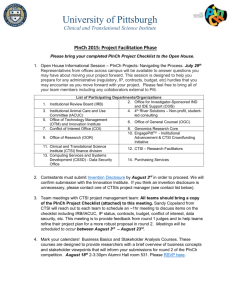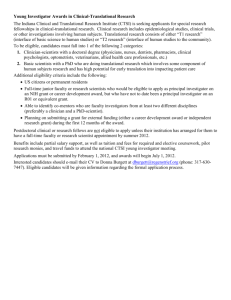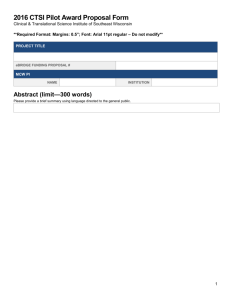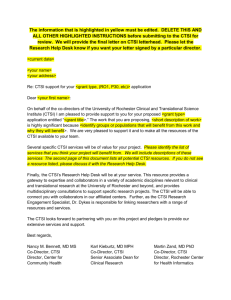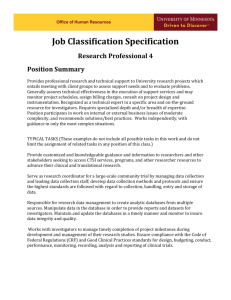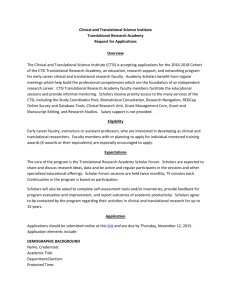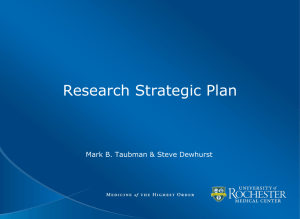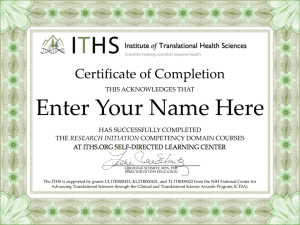Proposal for the Clinical and Translational Science Institute
advertisement
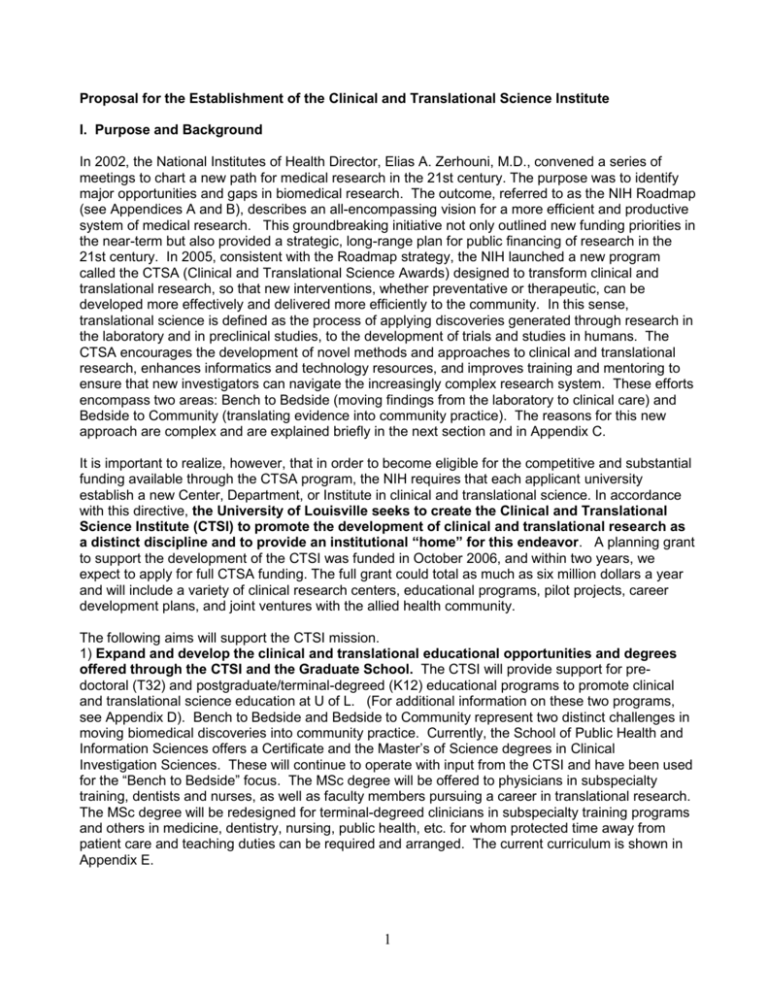
Proposal for the Establishment of the Clinical and Translational Science Institute I. Purpose and Background In 2002, the National Institutes of Health Director, Elias A. Zerhouni, M.D., convened a series of meetings to chart a new path for medical research in the 21st century. The purpose was to identify major opportunities and gaps in biomedical research. The outcome, referred to as the NIH Roadmap (see Appendices A and B), describes an all-encompassing vision for a more efficient and productive system of medical research. This groundbreaking initiative not only outlined new funding priorities in the near-term but also provided a strategic, long-range plan for public financing of research in the 21st century. In 2005, consistent with the Roadmap strategy, the NIH launched a new program called the CTSA (Clinical and Translational Science Awards) designed to transform clinical and translational research, so that new interventions, whether preventative or therapeutic, can be developed more effectively and delivered more efficiently to the community. In this sense, translational science is defined as the process of applying discoveries generated through research in the laboratory and in preclinical studies, to the development of trials and studies in humans. The CTSA encourages the development of novel methods and approaches to clinical and translational research, enhances informatics and technology resources, and improves training and mentoring to ensure that new investigators can navigate the increasingly complex research system. These efforts encompass two areas: Bench to Bedside (moving findings from the laboratory to clinical care) and Bedside to Community (translating evidence into community practice). The reasons for this new approach are complex and are explained briefly in the next section and in Appendix C. It is important to realize, however, that in order to become eligible for the competitive and substantial funding available through the CTSA program, the NIH requires that each applicant university establish a new Center, Department, or Institute in clinical and translational science. In accordance with this directive, the University of Louisville seeks to create the Clinical and Translational Science Institute (CTSI) to promote the development of clinical and translational research as a distinct discipline and to provide an institutional “home” for this endeavor. A planning grant to support the development of the CTSI was funded in October 2006, and within two years, we expect to apply for full CTSA funding. The full grant could total as much as six million dollars a year and will include a variety of clinical research centers, educational programs, pilot projects, career development plans, and joint ventures with the allied health community. The following aims will support the CTSI mission. 1) Expand and develop the clinical and translational educational opportunities and degrees offered through the CTSI and the Graduate School. The CTSI will provide support for predoctoral (T32) and postgraduate/terminal-degreed (K12) educational programs to promote clinical and translational science education at U of L. (For additional information on these two programs, see Appendix D). Bench to Bedside and Bedside to Community represent two distinct challenges in moving biomedical discoveries into community practice. Currently, the School of Public Health and Information Sciences offers a Certificate and the Master’s of Science degrees in Clinical Investigation Sciences. These will continue to operate with input from the CTSI and have been used for the “Bench to Bedside” focus. The MSc degree will be offered to physicians in subspecialty training, dentists and nurses, as well as faculty members pursuing a career in translational research. The MSc degree will be redesigned for terminal-degreed clinicians in subspecialty training programs and others in medicine, dentistry, nursing, public health, etc. for whom protected time away from patient care and teaching duties can be required and arranged. The current curriculum is shown in Appendix E. 1 University of Louisville currently offers the interdisciplinary MS and Ph.D degrees. During the last six months, the CTSI leadership, with the help of Dr. DeMarco, have utilized the interdisciplinary MS degree to develop postgraduate (post MD and/or Ph.D.) a Mentored Clinical Scientist Development Program Award, termed a K12 award by NIH. The K12 program provides an award to educational institutions to support career development experiences for clinical investigators leading to research independence, and it is a mandatory component of the CTSA. For the CTSI, these degrees will be aimed at a diverse cast of professionals from different programs (postdoctoral students, clinical fellows, and junior faculty) who are preparing for a career in academia with an emphasis on clinical and translational sciences. These programs will be truly interdisciplinary, involving the College of Arts and Sciences, Speed School of Engineering and Kent School of Social Work, as well as the HSC schools (Medicine, Dentistry, Nursing, Public Health and Information Sciences) and others. The CTSI has worked closely with the Graduate School and will continue to work with the Provost’s transition team to develop new programs and enhance existing curricula to meet the CTSA challenge. Both the MSc and Intedisciplinary degrees are being offered with a translational research emphasis to complement existing graduate degrees and postgraduate education. These degrees will not substitute for specific School/College degrees required for careers in specific disciplines, ie. PhD in Nursing. Additionally, the CTSI will coordinate a comprehensive mentoring program in clinical and translational sciences in several concentration areas including cardiology and cardiovascular surgery, oncology; community and geriatric medicine; neurological sciences; pediatrics; ophthalmology; clinical and environmental toxicology, transplantation; and clinical outcomes/public health. Appendix F details development components for future faculty and mentoring groups. 2) Develop novel clinical and translational methodologies and resources. The CTSI will continue to build upon key areas of strength including pharmocogenetics, proteomics, metabolomics, drug development and design, and bioethics. These resources are critical for new drug/device development and new biomarker discovery. 3) Integrate university-wide activities in bioinformatics, clinical informatics, statistical and regulatory support into a central cohesive unit to promote the clinical and translational science enterprise at UofL. The NIH Roadmap identifies these areas as major barriers to the conduct of effective biomedical research. The CTSI will build research capacity in the areas of computational biology, bioinformatics and biostatistical expertise in accordance with the paradigm shift in research and funding opportunities in the life sciences and in accordance with the NIH Roadmap. 4) Expand and integrate a clinical and translational research resources network. Over the past ten years, UofL and its healthcare partners have begun developing the critical resources needed to perform clinical and translational research. Existing and expanded networks throughout the city and state will be used to translate research into best practices. Moreover, we will continue to seek new partnerships, particularly in areas/populations that are medically underserved. Background Between 1999 and 2003, the NIH doubled its budget for research. During that same period, UofL not only matched the increase – but actually quadrupled – our amount of NIH funding. Indeed, UofL was the national leader in percentage of increased funding as described by Brainard in “What the NIH Bought with Double the Money” Chronicle of Higher Education (50(22): p. A17-A20, 2004). This was accomplished via a fortuitous convergence of resource development, strategic planning, support 2 from our healthcare partners, and direction from the state to become a nationally recognized metropolitan research university. UofL continues its trajectory (NIH funding of $49 in 2004 and $77 million in 2005) despite the fact that the NIH budget has been stagnant since 2003. The doubling of the NIH budget resulted in many important discoveries that now need to be applied to clinical practice (the bench to bedside concept) as quickly as possible. As Dr. Zerhouni noted, “It is the responsibility of those of us involved in today’s biomedical research enterprise to translate the remarkable scientific innovations we are witnessing into health gains for the nation” (Zerhouni EA. Translational and clinical science – time for a new vision. N Engl J Med. 2005 Oct 13;353(15):16213). The CTSAs are meant to serve as an institutional “home” to provide integrated physical and academic resources unique to an individual institution in order to facilitate the conduct of clinical and translational research. The purpose of the CTSA funding announcement is to assist institutions in forging a “uniquely transformative, novel, and integrative academic home for Clinical and Translational Sciences that has the consolidated resources to: 1) captivate, advance, and nurture a cadre of well-trained multi- and inter-disciplinary investigators and research teams; 2) create an incubator for innovative research tools and information technologies; and 3) synergize multi-disciplinary and inter-disciplinary clinical and translational research and researchers to catalyze the application of new knowledge and techniques to clinical practice at the front lines of patient care” (NIH Roadmap for Medical Research: Engineering the Clinical Research Enterprise, 2005). Accordingly, the NIH specifies that each institution must create a program specific to its unique needs and structure, and must offer educational opportunities, mentoring, and degrees to further the mission. All such programs must “accrue significant institutional support, be granted status as a major administrative entity within the applicant institution, and the program director must have authority, perhaps shared with other high-level institutional officials, over requisite space, resources, faculty appointments, protected time, and promotion.” (NIH RFA-RM-07-007: Institutional Clinical and Translational Science Award U54, 2006) Since there are 126 medical schools, this NIH initiative will effectively divide medical schools into tier one and tier two categories. It is vital that we capitalize on this opportunity to promote our research agenda; failure to do so will significantly inhibit our ability to maintain or grow our research capabilities. Creation of the CTSI is absolutely necessary to ensure that UofL maintains our nationally recognized centers of excellence and strengthens our prominence in the national healthcare arena. As evidence of institutional support, the CTSI must be formally approved by the University before submission of the proposal to NIH by the October 24, 2007 deadline. II. Impact on University Goals The CTSI has a direct tie-in to the University’s mission to become a preeminent metropolitan research university. Indeed, without the CTSI, it will be difficult, if not impossible, to achieve our biomedical research goals. The CTSI will have a major impact on all five institutional goals as established in the Challenge for Excellence. Goal One: Student Success. The training and career programs, which are required and recommended components of a CTSA, will provide training and mentored career development for 3 predoctoral and postdoctoral students, fellows, and faculty. The CTSI will provide research education, training, and career development opportunities (including certificates, interdisciplinary MS and Ph.D degrees, fellowships and new faculty awards) for physicians, nurses, dentists, research coordinators, and research scientists. The CTSI will take the lead in training the next generation of clinical and translational researchers. Goal Two: Research, Creative, and Scholarly Activities. Obviously, biomedical research is directly related to Goal Two. Continuing to build on existing strengths within the University, and fostering innovations through the CTSI, will strengthen UofL’s national reputation as a leader in biomedical research. A goal of the CTSI, which is harmonious with the NIH Roadmap, is breaking down barriers and fostering collaborative research within UofL as well as with the national and international scientific community. A major goal of CTSAs is to encourage cross-departmental, cross-school, and cross-campus interactions. The CTSI will foster these collaborations and further the goal of Research, Creative and Scholarly Activities. Goal Three: Accessibility, Diversity, Equity and Communication. The CTSI will maintain a focused commitment to identifying, attracting, training and retaining minorities as well as individuals from other groups who have traditionally been underrepresented in science-related fields. Moreover, a goal of the CTSI is to partner with historically medically underserved populations and geographic groups to translate medical research results into standard of care. Goal Four: Partnerships and Collaborations. Over the past 10 years, UofL and its healthcare partners have begun developing critical resources needed to perform clinical and translational research and to care for citizens of the region and state. We now have networks throughout the city and state which can be used to translate research into best practices. In addition to University Hospital, the CTSI will partner with the James Graham Brown Cancer Center, the V.A. Medical Center, Jewish Hospital and St. Mary’s HealthCare, and Norton Healthcare (which includes Kosair Children’s Hospital), and the Louisville Metro Public Health Department to develop satellite opportunities for patient recruitment and translational research in the central and western half of Kentucky, southern Indiana, as well as several additional sites in eastern Kentucky. Adewale Troutman, MD, MPH, Associate Professor, School of Public Health and Information Sciences and Director of the Louisville Metro Public Health and Wellness will chair the taskforce to coordinate all the community partners and community sites. Thus the CTSI will have an extensive presence in rural areas, small cities, and inner city neighborhoods. These enhanced partnerships will not only improve our science, but also the health and well being of the citizens in our region. Goal Five: Institutional Effectiveness of Programs and Services. The CTSI will improve the effectiveness of programs and services in fulfilling the mission and vision of the university. Indeed, it can be argued that failure to follow the path outlined by the NIH Roadmap for research would negatively affect institutional investments and outcomes. Appendix G lists the specific Scorecard goals toward which the CTSI can make a positive contribution. In addition to advancing University goals, it is readily apparent, based upon a review of mission statements from the involved Colleges and Schools, (Appendix H) that the mission and the goals of the CTSI are in harmony with those of our partner academic units. Section III. Governance NIH requires that the Director of the clinical and translational science institute (CTSI) report to a high level position within the University. Accordingly, Dr. Craig McClain, Director of the CTSI, and Associate Vice President for Translational Research, will report to Dr. Manuel Martinez- 4 Maldonado, the Executive Vice President for Research. The proposed organizational chart is shown in Appendix I. Dr. McClain, will have overall responsibility for administration of the CTSI. As Project PI and Director, Dr. McClain will devote at least 20% of his time to the CTSI program. Dr. McClain is a widely recognized expert in liver disease, nutrition, oxidative stress and cytokine research. In addition, he has extensive administrative and mentoring experience and is a knowledgeable grants and program administrator. His research has been continuously federally funded since 1977 and he currently receives research support from the VA, NIH, and industry. He is also a member of the NIH Peer Review Advisory Group (PRAC) and is past president of the American College of Nutrition. Dr. McClain’s UBM, and administrative assistant, as well as the U of L Clinical Research Center administrator and nurse, are included in the CTSI budget (Forms 1 and 2) and will assist Dr. McClain in the day to day operation of the Institute. The Office of Sponsored Programs and Health Sciences Center Research Office have and will continue to work with Dr. McClain in the formation of the CTSI and the CTSA grant proposal as a part of grant preparation and support responsibilities and the Department of Medicine Grants Facilitator will also provide assistance. Dr. Carlton Hornung, Ph.D., M.P.H. has extensive experience in clinical research education and training and, as Program Director for Education, will devote 30% of his effort. Dr. Hornung, as Education Director, will report to Dr. McClain. Dr. Hornung created the Clinical Research, Epidemiology and Statistics Training (CREST) program at UofL in 1999 and obtained Clinical Research Curriculum Development (NIH K30) funding from NIH in 2000. Dr. Tom Knudsen, Professor of Dentistry, is a well-known expert in bioinformatics. Since the NIH defines bioinformatics as a key area, Dr. Knudsen is currently Program Director for Informatics and devote 10-15% of his time to developing this important resource at UofL. Dr. Knudsen currently serves as the PI on three NIH research grants. Pediatrics is defined by NIH as a key area for all CTSA awards. Thus, Dr. Jan Sullivan will serve as Program Director for Pediatrics and will devote 10% effort to this. Dr. Sullivan directs the Kosair Pediatric Pharmacology Research Unit, which is funded by NIH. The Executive Committee for the CTSI will consists of Drs. McClain, Hornung, Knudsen, Sullivan, and the chairs of the working group committees. This committee will meet at least quarterly. An Internal Advisory Committee has been formed and will play a vital role in this multidisciplinary and interdisciplinary effort. In addition to Drs. McClain , Hornung, Knudsen and Sullivan, members include Drs. Ron Atlas, Dean of the Graduate School; Rick Clover, Dean of the School of Public Health and Information Sciences; Don Miller, Director of the Brown Cancer Center; Denis Kinane, Associate Dean for Research and Enterprise of the School of Dentistry, Rob Keynton, Department Chair of Bioengineering; Barbara Speck, Associate Dean for Research in the School of Nursing; Riaan Van Zyl, Associate Dean for Research of the Kent School, Ken Ramos, Department Chair of Biochemistry; Eleanor Lederer, Acting Vice Dean for Research, School of Medicine; David Hein, Department Chair of Pharmacology & Toxicology; Manuel Martinez, EVPR; George Pack, Associate VPR; a representative from Jewish Hospital and St Mary’s HealthCare; and a representative from Norton Healthcare. Beverly Daly, Sponsored Programs Development; and Rita Wedig, HSC Research Office will serve ex officio. The Internal Advisory Committee will meet at least twice a year, and more often as needed. To avoid potential conflicts of interests, the NIH has requested that applicants delay the formation of external advisory committees until after several rounds of full CTSA grants have been awarded. 5 After the CTSA has been awarded, we will be free to invite nationally known experts on clinical and translational science to serve on the CTSI External Advisory Committee. Several additional working committees have been formed and have been meeting regularly over the course of the planning period. These include members specializing in Education, Bioinformatics and Biostatistics, Community Engagement, Facilities/Cores/Centers, Hospitals, Regulatory Affairs and Ethics, Partnerships in Innovation, and Pilot Projects. The Chairs of those committees constitute the Executive Committee which will meet frequently with the Director and the Internal Advisory Committee to determine policy and procedures. Committee members are listed in Appendix J. Section IV. Resources Initially, 2-3,000 square feet of space will be needed as operational space for the CTSI. Currently space has allocated in K building (wing) 2nd floor and Carmichael building. Increased space will be provided by the University commensurate with the Institute’s growth and ability to generate revenue. For example, Vanderbilt University, which just applied for a CTSA award in January, is building a 350,000 square foot building to house their CTSA effort. Additional resource detail, including necessary staff support, is provided in the budget section. Section V. Evaluation Plan The CTSI will conduct a formative evaluation that will provide on-going feedback to CTSI Program Directors, the Internal Advisory Committee and the Executive Committee. Implementation and achievement of educational and research goals will be assessed. Key constituency groups – senior and junior faculty linked to the Institute, students in CTSI programs, and representatives from medical and community health networks outside UofL – will provide input about CTSI initiatives and suggestions for expanding or improving the Institute’s activities will be solicited. The evaluation will draw heavily on existing UofL data systems to track student enrollment and graduation from certificate and degree programs, professional presentations and publications, as well as grant submissions and awards. CTSI program records (committee minutes, faculty appointments, etc.) will provide information on faculty involvement with CTSI planning and implementation of educational, mentoring and research initiatives. Each year the evaluation staff will pull together this information in order to monitor CTSI progress on key indicators related to enrollment and graduation rates, research funding and scholarly outcomes. The CTSI will form an interdisciplinary research review group to review unfunded research proposals for clinical and translational research. The purpose of the review will be to provide suggestions to strengthen proposals. These could include: other research faculty to be added to the research proposal; additional novel clinical or translational methodologies or resources to be utilized; and computational, mathematical, or statistical modeling expertise available through CTSI that could be used to enhance research proposals. This information will help the CTSI Program Directors, the Internal Advisory Committee, and the Executive Committee understand what needs to be done to build a greater research capacity at UofL. In addition, each year the evaluation staff will conduct electronic surveys of students involved in CTSI related certificate and degree programs, junior faculty and clinical fellows mentored by senior research faculty, non UofL medical and community health representatives with a commitment to research, and senior research faculty connected with the CTSI program. Each survey will focus on respondents’ degree of involvement with CTSI activities, reviews of their involvement and suggestions about how CTSI can expand or improve its initiatives to more effectively achieve its goals. 6 APPENDIX A: http://nihroadmap.nih.gov/overview.asp 7 APPENDIX B: 8 APPENDIX C: CTSA Info 9 10 Appendix D Descriptions of the K12 and T32 Career Development Components of the CTSI K12 Mentored Clinical Scientist Development Program Award (required by the CTSA) The purpose of the National Center for Research Resources (NCRR) Mentored Clinical Research Scholar (CRS) Program Award (K12) is to support an institutional career development program for physicians and other doctoral level investigators interested in clinical and translational research, to develop the skills to become independent patient-oriented clinical investigators. The institutional programs are to include activities that will provide candidates a comprehensive understanding of clinical research approaches that are fundamental and not necessarily disease-specific. Under this award, recently trained physicians and others will be selected to participate in an integrated didactic and mentored research program. Funds provided by this award may be used to support full or partial completion of an advanced degree in health-related research (e.g. M.S., M.P.H., Ph.D.). K12 Awards are granted to educational institutions, not individuals. In concert with a proposed mentor, an applicant for the CRS program proposes a comprehensive, individualized career development program that will prepare the trainee for an independent career in clinical research including patient-oriented research. The didactic and research phases of this program must include acquiring expertise across a broad spectrum of research methodologies, technologies, concepts, use and management of large datasets, bioinformatics and other research tools as well as communication skills required for a participating physician or dentist to be well trained in their selected research discipline. The program should be designed to accommodate candidates with varying levels of research experience. If appropriate, candidates should be exposed to both research that is typically undertaken with a few investigators and to research approaches that require a multidisciplinary team to address complex research questions. The team research approach fosters cross-disciplinary collaborations. The K12 award will provide for a minimum of two years and a maximum of five years of consecutive funding for each Clinical Research Scholar, consisting of consecutive 12-month appointments. In general, 75 percent of the Clinical Research Scholars' full-time professional effort must be devoted to the K12 Program. However, certain clinical specialties can have less than 75 percent, but no less than 50 percent, protected time for this program if sufficiently justified (for example, surgical specialties requiring 50 percent direct patient care time to keep up surgical skills). (K12 description adapted from NIH FRA-RM-04-006, Multidisciplinary Clinical Research Career Development Programs, http://grants.nih.gov/grants/guide/rfa-files/RFA-RM-04-006.html) T32 Ruth L. Kirschstein National Research Service Award (NRSA) Institutional Research Training Grants The NIH will award NRSA T32 grants to eligible institutions as the primary means of supporting predoctoral research training to help ensure that a diverse and highly trained workforce is available to assume leadership roles related to the Nation’s biomedical, behavioral and clinical research agenda. The primary objective is to prepare qualified individuals for careers that have a significant impact on the health-related research needs of the Nation. For the CTSA grant, predoctoral funding is available only for disciplines in translational science. This program supports predoctoral training programs at domestic institutions of higher education. Only domestic, non-profit, private or public institutions that have strong and high-quality research 11 programs in the area(s) proposed for research training and have requisite staff and facilities may apply for grants to support a T32. Awards for T32 institutional NRSA research training grants may be for project periods up to five years in duration and are renewable. Trainees are required to pursue full-time research training. (T32 description adapted from NIH PA-06-048. http://grants1.nih.gov/grants/guide/pa-files/PA-06-468.html) 12 Appendix E: Existing Educational Components of The Clinical and Translational Science Institutes. Graduate Certificate: The Graduate Certificate program will become a vehicle for students who want to enter a graduate/professional discipline to obtain training in clinical and translational sciences. They can either use the certificate to site for their clinical research coordinator certification, apply the credits toward their graduate degree, or complement their existing degree with an appreciation for translational sciences. We will utilize existing courses and develop new ones to teach students basic skills including biostatistics, epidemiology, responsible conduct of human and animal research, regulatory issues and health services and outcomes research. M.Sc. Deqree Curriculum: The present curriculum for the M.Sc. degree is listed below; however, to meet the needs of the “Bench to Bedside” mission of this degree, the curriculum will be examined by an interdisciplinary team. This endeavor will also address comments from K30 reviewers and the current guidelines of the CTSA. Year 1 Summer Semester PHCI 501 – From Bench to Bedside: Introduction to Clinical Research (credit hours, 1) Fall Semester PHCI 611 - Introduction to Clinical Epidemiology (2) PHST 600 – Introduction to Biostatistics (3) PHCI 631 – Social and Behavioral Science in Health Care (2) PHCI 610 – New Drug and Device Development (2) PHCI 699 – Mentored Research (1-6) Spring Semester PHEP 602 – Epidemiological Methods (3) PHCI 624 – Clinical Trials I (2) PHCI 632 – Ethical Conduct of Health Care Research (2) PHCI 699 – Mentored Research (1-6) Year 2 Summer Semester PHCI 601 - Evaluating the Health Care Literature (1) PHCI 699 - Mentored Research (1-6) Fall Semester PHCI 625 – Clinical Trials II (2) PHCI 650 – Medical Decision Analysis (2) PHCI 602 – Health Services and Outcomes Research (2) PHCI 699 – Mentored Research (1-6) Spring Semester PHCI 699 – Mentored Research (1-6) 13 Appendix F: Future Postdoctoral, Fellow and Faculty Development Components of the Clinical and Translational Science Institutes From Fellow to Faculty: Recruiting New Faculty: We will implement a two year program and create a pool of funds to support the transition “From Fellow to Faculty” for one fellow in Pediatrics and one fellow in medicine who are interested in a career in academic medicine. Dr. Larry Cook (EVPHA) and Dr. Gerard Rabalais (Pediatrics) are supporting this career development program for physician scientists. It will be modeled after the NIH K12 Career Development Award. If Uof L obtains a CTSA grant, this program will be expanded to support the recruitment of new faculty for the SON, SOD, SPHIS and the basic sciences on the Belknap campus. These awards will be competitive. A goal is to have the CTSI provide salaries for 75% protected time for these ‘clinical research scholars’ for two years while they complete the Interdisciplinary MS or the MSc degree. Scholars funded under this initiative will be required to submit a K08 Mentored Clinical Scientist Research Career Development Award, K23 Mentored Patient-Oriented Research Career Development Award or similar proposal to satisfy degree requirements. The clinical research scholar will be given a three-year, term faculty appointment at the rank of Lecturer or Assistant Professor (depending upon the Department’s board certification requirements for academic rank), and the Department Chair must guarantee 75% protected research time for three years. Faculty Development: The CTSI, along with our Office of Sponsored Programs and the Health Sciences Center Research Office, will assist faculty in identifying funding sources and in the preparation of multi-disciplinary, multi-school and multi-institutional grant proposals. The Institute will establish a library of successful grant proposals to share with potential applicants. Junior faculty will have a senior established investigator assigned to them as a mentor and an epidemiological and/or biostatistician supported by the Center will guide them in the preparation of their grant proposals. We will also help them obtain internal or external funding for necessary pilot studies. We will provide guidance in the preparation of budgets and other required documents. We will conduct mock study sections to review proposals and provide applicants with written comments prior to submission. Helping faculty become better teachers and mentors for students is an important task of the CTSI. To accomplish this, we will encourage all faculty, and especially junior faculty, to attend our monthly seminar series for health educators conducted by the SOM. The CTSI will include an Education Committee with faculty drawn from across the University and nominated by their respective Deans. This committee will be charged with identifying duplication of clinical and translational science courses in the health professional schools and the graduate school, identifying gaps and/or inconsistencies in course offerings, and suggesting innovative ways in which we can meet the education and training needs of the next generation of clinical and translational scientists. The committee will consult with experts from around the country on strategies for creating inter-disciplinary and inter-school curricula and learning environments. Having a shared learning environment may be the single most important factor in stimulating interdisciplinary, inter-school and inter-institutional research. The committee will coordinate training grant efforts across the university to ensure the best utilization of resources and best utilization of our senior mentors. Mentoring: At U of L, we have a strong pool of senior mentors who are enthusiastic about guiding new students/faculty/fellows. We have listed three investigators from each of our initial focus areas of mentoring. An asterisk denotes mentors holding endowed chairs, or university scholar awards, thus demonstrating the impact of the Challenge for Excellence. All faculty members listed below have extensive mentoring experience. Dr. McClain, the Director, is an excellent example. He has mentored over 23 residents and fellows, and more than 25 students have obtained Ph.D.’s in his laboratory working in the areas of nutrition or toxicology, or have served as postdoctoral fellows in those areas. Perhaps most importantly, he has mentored 19 junior faculty who obtained 21 career awards similar to the NIH K awards; all but two are still in academic medicine. Currently, he serves 14 as mentor for four K-awardees, and another has just finished working with his group. Two already have RO1 funding. It can be clearly demonstrated that strength in mentoring is a highlight of our program. Cardiology and Cardiovascular Surgery: *Sumanth Prabhu, MD, Professor of Cardiology, SOM *Laman Gray, MD, Professor of Surgery, SOM *Rob Keynton, Ph.D, , Chair and Professor of Bioengineering, Speed School of Engineering Oncology: *Donald Miller, MD, Ph.D, Director, Brown Cancer Center & Professor, SOM Glenn McGregor, MD, Assoc. Professor of Pharmacology, SOM *John Eaton, Ph.D, Deputy Dir., Brown Cancer Center & Professor, SOM Community and Geriatric Medicine: *Toni Miles, MD, Ph.D, Professor of Community & Geriatric Medicine, SOM Adewale Troutman, MD, MPH, Director, Louisville Metro Public Health and Wellness & Assoc. Professor, SPHIS Kay Roberts, EdD, FAAN, ARNP, Professor, SON Neurological Sciences: *Christopher Shields, MD, Chair and Professor of Neurosurgery, SOM *Manuel Casanova, MD, Professor of Psychiatry, SOM *Scott Whittemore, Ph.D, Professor of Anatomical. Sciences, SOM Ophthalmology: *Henry Kaplan, MD, Chair and Professor of Ophthalmology, SOM *Gary Foulks, MD, Professor of Ophthalmology, SOM Tongalp H. Tezel, MD, Assistant Professor of Ophthalmology, SOM Pediatrics: *David Gozal, MD, Professor & Dir. Pediatric Research Institute, SOM Jan Sullivan, MD, Professor & Dir. of Kosairs Charities Hosp. CRU, Pediatrics, SOM *Dennis Molfese, Ph.D, Professor, Birth Defects Research Center, SOD Clinical and Environmental Toxicology: *Craig McClain, MD, (Principal Investigator) Professor of Gastroenterology, SOM *Aruni Bhatnagar, Ph.D., Professor of Cardiology, SOM *David Hein, Ph.D, Chair & Professor of Pharmacology, SOM Transplantation: *Suzanne Ildstad, MD, Prof., Dept. of Surgery & Dir. Institute of Cellular Therapeutics, SOM Haval Shirwan, Ph.D, Professor of Microbiology & Institute of Cellular Therapeutics, SOM Robert Dowling, MD, Professor of Surgery, SOM 15 Clinical Outcomes/Public Health: *Denis Kinane, BDS, PhD, Associate Dean of Research, SOD William P. McKinney, MD, Associate Dean of Research & Professor, SPHIS *David Tollerud, MD, MPH, Chair and Professor of Environmental. & Occupational Health Sciences, SPHIS *Endowed chairs and University Scholars 16 Appendix G: Scorecard Goals Specifically, formation of an innovative, robust CTSI would make a positive contribution toward achievement of the following Scorecard goals: 1.6 1.11 2.3 2.4 2.5 2.6 2.7 2.8 2.9 2.10 2.11 2.12 2.14 2.16 2.17 2.18 3.3 3.17 3.18 3.19 4.1 4.2 4.3 4.8 4.9 4.11 4.12 4.13 4.14 Number of undergraduate students involved in research or creative activity in collaboration with faculty Number of disciplines graduating doctoral students Nationally recognized programs Total number of grants and contracts awarded Total grants and contracts -- dollar amount received by PI’s unit Total grants and contracts -- dollar amount by collaborating investigators. Total number of research grants and contracts proposals submitted Total number of research grants and contracts awarded Total research grants and contracts -- dollar amount received Total federal research grants and contracts – dollar amount received Extramural research and development expenditures (NSF) Federal research and development expenditures (NSF) Invention disclosures received Number of faculty on sponsored research Number of students on funded research Total publications in refereed journals Number of African American professional students Number of African American students receiving doctoral degrees Number of women receiving doctoral degrees Number of African American students receiving master’s degrees Number of faculty teaching across academic disciplines Number of interdisciplinary grant applications Number of interdisciplinary research projects Number of joint grants with industries (e.g. SBIR) Number of partnerships that support local metropolitan area government agencies Number of partnerships that support community-based organizations Number of partnerships that support health-care organizations Number of partnerships with state and regional agencies Number of collaborative programs with K-12 educational institutions 17 Appendix H: Mission Statements School of Medicine To be a vital component in the University of Louisville’s quest to become a premier, nationally recognized metropolitan research university, To excel in the education of physicians and scientists for careers in teaching, research, patient care and community service, and To bring the fundamental discoveries of our basic and clinical scientists to the bedside. School of Nursing The University of Louisville School of Nursing is an essential partner of a research intensive academic health science center in a nationally recognized University serving a metropolitan community. The School of Nursing is a community in which faculty, staff and students collaborate to promote excellence in the profession of nursing. This is accomplished through research and scholarship that inform undergraduate and graduate education, support evidence-based practice and foster advances in nursing science. Students are prepared to demonstrate excellence in nursing science, practice and leadership in a variety of settings for the benefit of clients across the lifespan and to meet the evolving health care needs of society. As a citizen of the larger community, the emphasis of the School of Nursing is to address the complex health needs of diverse and dynamic populations through nursing education, research, scholarship and service. School of Public Health and Information Sciences The School of Public Health and Information Sciences will be a national center of excellence for research and education in population-focused health sciences, including community health, population health, and health information sciences. School of Dentistry The University of Louisville School of Dentistry, through excellence in teaching and research, will educate competent dental professionals. The school will provide quality dental care and will serve the community to fulfill our urban and statewide missions. Speed Engineering School The mission of the J. B. Speed School of Engineering is to serve the university, the Commonwealth of Kentucky, and the engineering profession by providing high quality educational programs to all students; engaging in research and scholarship that will extend knowledge; and assisting the economic development of the regional, state and national economies through technology transfer. Kent School of Social Work The Kent School of Social Work seeks to prepare competently trained social workers who practice from a strong professional value base to serve the metropolitan mission of the university. These social workers are educated to practice with individuals, families, and communities and to promote social justice. In the context of a research institution, the Kent School is committed to knowledge development that informs the practice of social work, recognizing the importance of collaboration among differing disciplines to solve complex social problems. 18 Arts and Sciences The mission of the College of Arts and Sciences is to improve life in the Commonwealth and particularly in the greater Louisville urban area, creating knowledge through its research, sharing knowledge through its teaching, and guiding all its students to realize their potential. 19 Appendix I: University of Louisville’s CTSI President’s Office President Provost Executive VP for Research Executive VP for Health Affairs Internal Advisory Committee -Deans -Hospitals -Others Director, CTSI External Advisory Committee Program Director, Education Program Director, Pediatrics Program Director, Informatics CTSI Executive Committee Pediatrics Novel Clinical & Translational Methodologies Clinical Research Resources Regulatory Affairs Community Bioinformatics Outreach AHEC TroverClinic Health Depts. 20 Translational Technology & Resources Pilots Education Studies Interdisciplinary MS/PhD Training grants Curriculum Dev. Biostatistics Methodologies & Ethics Appendix J: CTSI Workgroups Education: Program Director: Carl Hornung, Professor, School of Public Health & Information Sciences Ron Atlas Dean, Graduate School Erin Mulford-Brown Jewish Hospital and St. Mary's HealthCare Beverly Daly Staff, Sponsored Programs Development Carl Hornung Professor, School of Public Health and Information Sciences Anna Faul Associate Dean, Kent School of Social Work Cynthia McCurren Acting Dean, School of Nursing Russell Prough Special Assistant to the Dean; Professor of Biochemistry, School of Medicine Peter Rowell Professor of Pharmacology, School of Medicine Richard Stremel Professor of Physiology, School of Medicine Edward Halperin Dean, School of Medicine Rod Barber Professor, Kent School of Social Work Paul DeMarco Assoc. Dean, Graduate School Gerald Dryden Assistant Professor, of GI, School of Medicine David Hein Chair and Professor of Pharmacology, School of Medicine Steven Koenig Associate Professor, School of Medicine and Speed Sch. Engineering Susan Muldoon Assistant Professor, School of Public Health and Information Sciences David Scott Associate Professor, School of Dentistry Bioinformatics: Patricia Cerrito Richard Clover Nigel Cooper Bruce Edwards Adel Elmaghraby Robert Esterhay Aly Farag Tom Knudsen Troy May Greg Pugh Kenneth Ramos Walter Sobczyk Thomas Whittman Ben Yandell, Jr. Peter Walton Andrew Lane Charles Moyer Program Director: Tom Knudsen, Professor, School of Dentistry Professor of Mathematics, College of Arts and Sciences Dean, School of Public Health and Information Sciences Professor of Anatomical Sciences, School of Medicine Privacy Officer, University of Louisville Professor, Speed School of Engineering Chair of Health Management and Systems Science, School of Public Health and Information Sciences Professor, Speed School of Engineering Professor, School of Dentistry Chief Information Officer, University of Louisville Hospital Jewish Hospital and St. Mary's HealthCare Chair of Biochemistry, School of Medicine Associate Professor of Pediatrics, School of Medicine Jewish Hospital and St. Mary's HealthCare Norton HealthCare Professor, School of Public Health and Information Sciences Professor Medicine, JGBCancer Center Dean, School of Business Biostatistics, Methodology and Ethics: William Dougherty Bioclinical Statistician, University of Louisville Hospital Rudoph Parrish Chair of Bioinformatics and Biostatistics, School of Public Health and Information Sciences 21 Ramona Stone Paul McKinney Susan Muldoon Mark Rothstein Larry Palmer David Doukas Jane Goldsmith Osborn Wiggins Kathy Baumgartner Richard Baumgartner Assistant. Professor, Kent School of Social Work Assoc. Dean, School of Public Health and Information Sciences Assoc. Professor, Biostatistics, Director of the CREST Program Director, Institute for Bioethics, Health and Law Professor, Institute for Bioethics, Health and Law Professor, Family and Geriatric Medicine Assoc. Prof, Biostatistics Chair, Department of Philosophy Department of Epidemiology Department of Epidemiology Community Engagement Marti Arvin Privacy Officer, University of Louisville Theresa Baker Trauma Coordinator, University of Louisville Hospital Ann Banks Office of External Affairs, U of L Gerard Barber Professor, Kent School of Social Work Ellen de Graffenreid Director of Marketing, U of L Health Science Center. Bonnie Ciarroccki Jefferson County Public Schools Sharon Elsesser Norton HealthCare Mary C. Lyle Co-Director, UAW-Ford Community Healthcare Initiative Lee Mayer Assistant Professor, School of Dentistry Suzanne Meeks Professor of Psychology, College of Arts & Sciences Toni Miles Professor of Family and Geriatric Medicine, School of Medicine Debbie Molnar Jewish Hospital and St. Mary's HealthCare Mark Pfieffer Professor of Medicine Irma Ramos Assistant Professor, School of Public Health and Information Sciences Kay Roberts Professor, School of Nursing Faye Jones Assoc. Dean Medicine and Director Area Health Education Centers, University of Louisville Adewale Troutman Director of Louisville Metro Public Health and Wellness and Associate Professor, School of Public Health and Information Sciences Rita Wedig Director, HSC Research Office Translational Technology and Resources: Teresa Fan Assoc. Prof. of Chemistry, College of Arts and Sciences Aly Farag Professor, Speed School of Engineering Jon Klein Professor, School of Medicine; Director, Proteomics Core Steven Koenig Associate Professor, School of Medicine and Speed Sch. Engineering William Pierce Professor of Pharmacology, School of Medicine Greg Rempala Assoc. Prof., Mathematics and Center for Genetic & Molecular Medicine Robert Topp Professor, School of Nursing Michael Voor Associate Professor of Orthopedic Surgery, School of Medicine Ronald Gregg Assoc. Prof. Biochemistry, JGB Cancer Center Eugenia Wang Professor, Biochemistry and Director Gheens Ctr. For Aging Alfred Jensen Professor, JGB Cancer Center Johnathan Chaires Professor, Medicine, JGB Cancer Center Michael Nantz Professor, Department of Chemistry Russ Prough Professor, Biochemistry, Special Assist. to Dean of Medicine 22 Clinical Research Resources: Lale Akca Outcomes Research Institute Bob Barbier CFO, University of Louisville Hospital Furqan Siddiqui Director of Clinical Research, University of Louisville Hospital Mary Jane Kennedy Assistant Professor of Pediatrics, School of Medicine, Co-Director, KCPCRU Eleanor Lederer Professor and Acting Vice Dean for Research, School of Medicine Steve Mahanes Manager Clinical Research Center Ed Miller Jewish Hospital and St. Mary's HealthCare Lynn Simon Medical Director, Jewish Hospital and St. Mary’s HealthCare Steven T Hester Vice President, Medical Affairs Norton Healthcare Tracy Williams Vice President, Norton HealthCare Linda Keithley Veterans Administration. Steve Winters Professor, Medicine, Director Clinical Research Center David Tollerud Professor, Medicine, Director, P30 Clinical Trials Center Jan Sullivan Professor, Pediatrics, Director, KCPCRU Ann Swank Professor of Exercise Physiology and Health Sciences, College of Education and Human Development Jason Chesney Department of Medicine, BCC Clinical Trials Craig McClain Professor, Department of Medicine; Assoc. VP Research Larry Cook Executive VP, Health Affairs Regulatory Affairs Mary Jane Adams Marti Arvin Karen Beatty John Burke Gary Foulks Nancy Gentry Rhonda Hoffman David King Angela Lewis-Klein Beth McCracken Holly Neibergs Cathy Whalen Cheri Hildreth University of Louisville Hospital Privacy Officer, University of Louisville Clinical Research Center, Liver Disease, School of Medicine Director of Human Subjects Protection Program, University of Louisville Professor of Ophthalmology, School of Medicine Jewish Hospital and St. Mary's HealthCare Jewish Hospital and St. Mary's HealthCare Director of Industry Contracts, University of Louisville Pediatric Pharmacology Research Unit, Pediatrics, School of Medicine Director of Research, Norton Hospital Director of Clinical Trials, Norton Hospital Pharmacy Manager, University of Louisville Hospital Director, Environmental Health and Safety, University of Louisville Novel Clinical and Translational Methodologies: Joanne Berryman Jewish Hospital and St. Mary's HealthCare Mark Carter Jewish Hospital and St. Mary's HealthCare John Eaton Professor, School of Medicine Teresa Fan Associate Professor of Chemistry, College of Arts and Sciences Steven Gailar President and CEO, Metacyte Business Labs Robert Keynton Chair and Professor Bioengineering, Speed School of Engineering David King Director, Office of Industrial Contracts Sean Kuntz Manager, Metacyte Business Labs David Phelps Venture Capitalist, CreoSalus Roland Valdez Professor of Pathology, School of Medicine James Zanewicz Director of Technology Transfer, University of Louisville Irene Litvan Professor, Neurology 23 . Pilot Projects Sven-Ulrik Gorr Robert Keynton Carolyn Mervis Paul McKinney Barbara Speck Christopher States Stephen Winters Manuel Martinez Professor, School of Dentistry Chair and Professor, Speed School of Engineering Professor of Psychology, Arts and Sciences Associate Dean and Professor, School of Public Health and Information Sciences Associate Dean and Professor, School of Nursing Professor of Pharmacology, School of Medicine Professor of Endocrinology, School of Medicine Executive Vice-President for Research Pediatrics: Program Director: Jan Sullivan, Professor of Pediatrics, School of Medicine Cook, Larry EVPHA Gozal, David Professor, Pediatrics Rabalais, Gerard Professor and Chair, Pediatrics Sullivan, Jan Professor, Pediatrics Paul Epstein Professor, Pediatrics David Adamkin Professor, Pediatrics Mary Jane Kennedy Asst.Prof., Pediatrics, Associate Director, KCPCRU Gary Marshall Pediatric Clinical Trials Unit 24 NARRATIVE FOR FORM 2: Amount and Sources of Revenue* 1. Regular state appropriation and tuition and fees a. New money Drs. Martinez and Halperin have promised 2.5 new FTE for bioinformatics and biostatistics (I,1 a, b, c, d on the budget page). Each are funded at approximately 50%, thus U of L Departments/Schools are providing the remainder of the funds to support a full FTE. The first 2 positions will be cosponsored by Schools of Dentistry, Nursing and Department of Pediatrics. Letters from Drs. Martinez and Halperin are attached documenting these commitments. A K12 postgraduate scholars program (fellow to faculty, page 1 and 10) is required for the CTSA grant, and Dr. Cook has committed to providing $75,000/year (2 year program, total $150,000) for the “fellow to faculty” program. The stipend will cover 75% release time, tuition, books, etc. Most of the fellows must pay out-of-state tuition, thus that has been included in the $75,000. b. 1. Internal reallocation for Personnel to cover Services needed in the CTSI: The K12 as mentioned above will require a core of clinical and translational courses. The same courses (approximately 22 hours) are now provided in the CREST Program (MSc Degree) in School of Public Health and Information Sciences (pages 9 and 10). A portion of the money Dr. Cook allocates for the CREST program will cover the cost of the K12 core courses (see Dr. Cook’s letter). These courses will be billed at a flat fee, including $7,000/2 credit hour or $4000/1 credit hour to the CTSI. Dr. Cook and Dr. Halperin currently fund the CRC, thus salary support for the CRC administrator and nd for the CRC nurse will come from those funds. In addition, nursing support is increased for the 2 rd and 3 year to cover the increased use of the CRC. University Hospital is now looking for PRN support to assist the CRC nurse with the increased workload. Because of the need for investigators, clinical and translational, to be competent in compliance and regulatory issues, it will become mandatory by the hospitals that training in those specific areas are covered. The partner hospital personnel (year 1 University Hospital), Executive Vice President for Research and CTSI administration have the expertise to teach those courses. Letters from University Hospital and Dr. Martinez include those personnel costs. b.2. Internal reallocation for CTSI Administration: Drs. McClain’s, Hornung’s, and Knudsen’s first year salary allocation to CTSI is covered by the Planning grant. The succeeding years will be covered by Dr. Martinez (letter provided). Because the CTSA RFA strongly recommends that a Pediatric component be included in the grant, Dr. Jan Sullivan will devote 0.1 FTE to the CTSI. Her salary will be contributed by the Department of Pediatrics as Dr. Gerard Rabalais letter indicates. Also included in the CTSI administration income is the Administrative Assistant, and the Unit Business Manager. Their salaries will be covered in LICTS by the EVPR (included in Dr. Martinez’s letter). All operating and capital costs, will be covered for the CTSI by Dr. Martinez except for the first year’s travel which is predominately covered by the planning grant. 25 2. Institutional allocation from restricted endowment: None 3. Institutional allocation from unrestricted endowment: None 4. Gifts: None; however, plans will be developed for a $10,000,000 fund raiser. 5. Extraordinary state appropriation: None 6. Grants or contracts a. Private sector b. Local government c. State d. Federal We have been awarded a CTSA planning grant, which would cover $150,000 for year 1, 10/06-9/07in support of Drs. McClain, Hornung, Sullivan, and Knudsen.. A full CTSA grant, approximately $ 4 million, will be submitted in the next year. Thus there is a possibility that it could nd be funded in years 3 to 4. We do not expect a fundable score until at least the 2 submission. e. Other 7. Capitation: None 8. Capital: None 9. Other (please specify): None 26 Budget Rational for Clinical and Translational Sciences Institute I, and II. A 3% increase in salaries and supplies/year has been included for all 3 years except for new FTE. I, 1. a Three bioinformatics people and two biostatisticians will ultimately be part of CTSI; however, the positions for the Institute are all funded at approximately 50% and are in the budgets of Dr. Martinez and Dr. Halperin. The positions are being matched and allocated as follows for the first year, FY 07-08,: a junior faculty (biostatistician) FTE, CTSI portion of the salary $54,574 (fringe $11,733), and matching funding from the Schools of Dentistry and Nursing for one full FTE; a second position (biostatistician) at the senior faculty level, CTSI portion of the salary $94,650 (fringe $20,350) will be matched by the Department of Pediatrics. Thus the total amount allocated for CTSI for year 1 is $181,307 has been matched. Thus 2 positions will be offered. For subsequent years, FY2 (two junior faculty positions at 50% funding, $132,615) and 3 (one senior level faculty at 50% funding, $115,000), the same method will be used to financially supplement those positions. The three positions for FY2 and 3 are bioinformatics positions. Drs. Martinez, McClain, and Knudsen are drafting long term bioinformatic needs based on the UofL Research Strategic Plan. When the Strategic Plan is completed, the focus and faculty requirements can be developed that complement the CTSI. This will impact the source that will be approached for the matching funds to provide a full FTE. I, e. The existing FTEF includes .2FTE for Dr. McClain, .3FTE for Dr. Hornung, .1FTE for Dr. Sullivan and .15FTE for Dr. Knudsen. In addition, the funding for faculty who will teach in the K12 postgraduate core education program are listed in this section. The School of Public Health and Information Sciences (SPHIS) and CTSI have listed core courses for this component of the CTSA grant and SPHIS will charge the CTSI a flat fee which includes approximately $7,000 for 2 credit hours, or $4000 for 1 credit hour. The SPHIS have calculated that the first year’s charge will be $96,250. That amount was increased 3% for years 2 and 3 as indicated above. I, 1.e & II. The Clinical Research Centers (CRC, University Hospital and Kosair Children’s Hospital) as a part of the CTSA must offer training in regulatory issues (human subjects and HIPAA), clinical trails, budgeting, etc. This component of the CRC will be covered by part-time faculty. The parttime FTE faculty are individuals employed at our partnering hospitals whose jobs include the skills needed to teach segments of the program. In addition, components of the program (regulatory) will be covered by Dr. Martinez’s staff. The budgets for the 2nd year will increase with the offerings of budgetary issues, compliance, audits, hospital credentialing, etc. These courses will be available to all faculty and students interested in translational research and a portion of them required for clinical research at partnering hospitals. I, 3. The Clinical Research Center (CRC) Administrator (Steve Mahanes) and Nurse (Karen Beatty) are included in the budget and are currently covered in Dr. Cook’s budget and will be reallocated to the CTSI. The CRC is a mandatory part of CTSI as it is required for all Clinical and Translational Scientific Awards (CTSA). We anticipate the need for a second nurse starting in year 2. 27 Included in the CTSI administrative budget are a secretary (administrative assistant) and a unit business manager. The Secretary is a current employee who will spend 50% of her time in year 1 on CTSI and increase to ¾ time in year 2; the UBM is likewise an existing UBM who will spend 25% of her time in year 1 and increase over to 50% in year 2. II, 1. The CRC supplies are not included in this budget as they are dependent on the clinical studies being conducted in the CRC. The general supplies for the CTSI are covered in Dr. Martinez’s budget. The supply category does include office supplies for CTSI and supplies/advertising needed for recruitment of the faculty indicated above. II, 2 The travel category includes bringing in experts for consultation and evaluation (external review committee) and the costs for recruitment of faculty listed above. II, 3. No additional Library support is needed. A letter from Neal Nixon, the Director of Kornhauser Library is attached. II, 4. Support is for post-doctoral research and clinical fellows (must have completed MD degree and residency). The figure ($75,000/fellow) assumes out-of-state tuition and fees and at least a 75% stipend as required for an NIH K12 program. This is a fellow to faculty program that requires the scholar in the 2nd year to apply to NIH for K23 grant support. Dr. Cook has agreed to support one new K-12 Scholars each year. Thus there will be one new and one existing K12 scholar for the 2nd and 3rd years. A K12 program is required for a CTSA. II, 5. The equipment category for the CTSI includes computers and software for the new faculty in biostatistics and bioinformatics, in addition, a copy center will need to be available in the CTSI facilities for education (available also to CTSI) and instructional media. III. Renovation costs include present facilities and additional facilities available in the future in the K building. Both require some remodeling and furnishings to accommodate CTSI personnel. A portion of those costs will be included. 28
